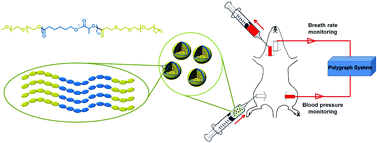Blood transfusions are crucial for the successful treatment of many diseases and injuries. However, as we all know, donated blood can often be in short supply. Further, donated blood must always be screened for carrier diseases. In this study, the researchers aim to develop an encapsulation system for hemoglobin (a key component of blood transfusions) which can one day be used as a substitute for donated blood in the clinic.
The researchers used PEG (polyethylene-glycol) and PCL (poly caprolactone) as starting materials to build what they term ‘polymersomes’, or triblock copolymers consisting of a water-insoluble PCL segment and two water-soluble PEG chains. The hemoglobin-polymer aggregates were mixed into blood plasma substitute solutions. Once encapsulated, the hemoglobin-containing particles were studied to determine that the hemoglobin continued to be reactive. Most importantly, the researchers demonstrated that the encapsulated hemoglobin could continue to bind oxygen. Ascorbic acid was added to prevent hemoglobin from being oxidized to methemoglobin, an unreactive form of hemoglobin.
The researchers then demonstrated that hemoglobin could be contained in these polymersomes for up to 1 week with only 7% leakage of hemoglobin. The hemoglobin-polymersome particles were almost completely nontoxic to cells outside of the body, and did not interfere with regular blood components. Finally, animal studies were conducted where rats were first subjected to severe blood loss, followed by the introduction of hemoglobin-containing polymersomes. When hemoglobin-containing polymersomes were introduced, the animals recovered in a manner that was comparable to recovery after a blood transfusion. Further, the animals suffered only minimal inflammation after the polymersome treatment as compared to the introduction of non-encapsulated hemoglobin. This work is therefore an important step in demonstrating the feasibility of using similar ‘blood substitutes’ in clinical therapy in the future.
Asymmetric copolymer vesicles to serve as a hemoglobin vector for ischemia therapy
Bin Li, Yanxin Qi, ShaSha He, Yupeng Wang, Zhigang Xie, Xiabin Jing and Yubin Huang
Biomater. Sci., 2014, 2, 1254-1261 DOI: 10.1039/C4BM00123K
Debanti Sengupta recently completed her PhD in Chemistry from Stanford University. She is currently a Siebel postdoctoral scholar at the University of California, Berkeley.
Follow the latest journal news on Twitter @BioMaterSci or go to our Facebook page.











